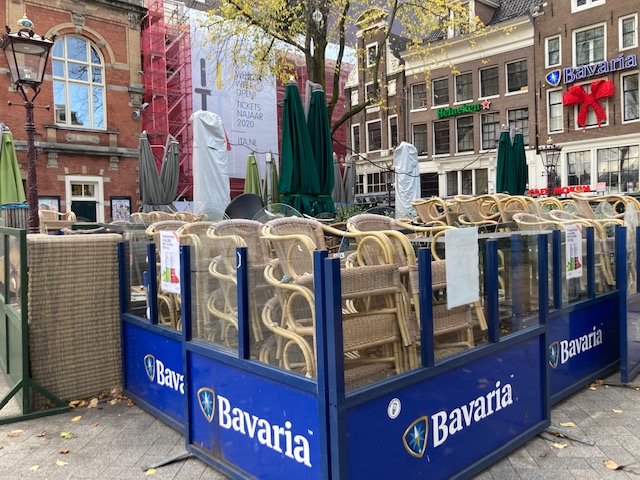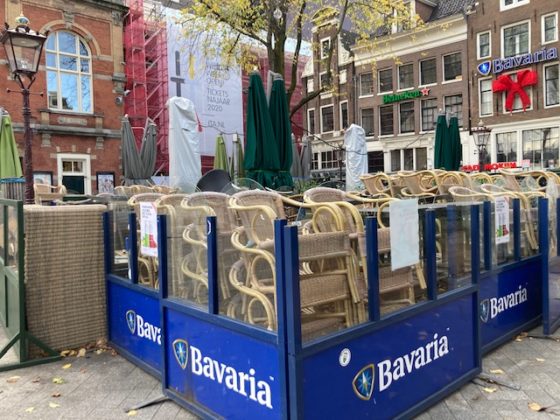Ministers under pressure to change course on terraces and vaccines


Ministers are expected to confirm that lockdown rules will not be relaxed until April 28 at the earliest at Tuesday evening’s press conference, despite coming under mounting pressure to open pavement cafes sooner.
A leaked document last week suggested that the cabinet hoped to scrap the 10pm curfew, extend the number of visitors allowed at home and allow bars and restaurants to serve guests outside from April 21.
But with infections rising again in recent days and the number of coronavirus patients in intensive care at its highest level for almost a year, health minister Hugo de Jonge had to temper hopes last week.
On Sunday, after the weekly meeting with the Outbreak Management Team at the Catshuis, the cabinet said in a statement that the current rules would apply until April 28 and any relaxation was conditional on infections coming down.
On the same day more than 8,200 new coronavirus cases were announced, the highest daily figure for two weeks. The number of intensive care patients almost reached 800 in the last week, prompting some hospitals to clear extra space by postponing heart and cancer surgery.
Policing impossible
The government’s announcement was criticised by the catering sector and the mayors of the four largest cities, who said the rules were becoming impossible to police. Ahmed Aboutaleb, mayor of Rotterdam, said: ‘We can only enforce the rules with water cannon, but that’s an aggressive way to deal with your population.’
The movement to reopen cafe terraces also won support from some in the medical profession, who argued that allowing people to socialise outdoors under regulated conditions was a safer option than informal gatherings in parks and gardens.
Mark Kramer, executive board member at Amsterdam’s UMC, told Nieuwsuur: ‘Do we allow uncontrolled outdoor activities to continue, or do we give people the opportunity to do more outdoors in a controlled setting and prevent the kind of very serious incidents that I’ve seen myself, such as in the Vondelpark?’
Vaccination schedule
The cabinet is also expected to revise its vaccination strategy as the Netherlands lags behind other EU countries. The healthcare advisory body Gezondheidsraad said on Monday that the interval between jabs for the Pfizer and Moderna vaccine could be extended to 12 weeks, allowing more people to receive a first shot earlier.
Currently the two doses of Pfizer are delivered six weeks apart, while for Moderna the interval is four weeks. The Gezondheisraad warned that delaying the second dose meant people would have fewer antibodies in their bloodstream and increased the risk of new variants such as the Brazilian strain taking hold.
So far around 3.2 million vaccine doses have been given in the Netherlands, while around 5.5% of the population is fully vaccinated, mostly healthcare workers and people over 80.
The government is also under pressure to let people under 60 choose whether to receive the AstraZeneca vaccine. Last week De Jonge halted use of the vaccine for under-60s because of the small risk of potentially fatal blood clots, on the advice of the Gezondheidsraad. Health officials have urged the minister to reconsider the decision and let individuals choose, as is allowed in countries such as Germany and Italy.
Ben van der Zeijst, emeritus professor at Leiden University’s department of medical microbiology, said: ‘I’m fully in favour of under-60s having the choice themselves. The current advice isn’t a balanced advice like the advice in the UK, for example. They have only looked at the potential dangers, not the advantages.’
Finally, the cabinet will have to decide who receives the first batch of Janssen single-shot vaccines, which are due to be delivered later this month. The 80,000 doses were delivered on Monday and are part of a total order of 11.3 million vaccines for 2021.
Thank you for donating to DutchNews.nl.
We could not provide the Dutch News service, and keep it free of charge, without the generous support of our readers. Your donations allow us to report on issues you tell us matter, and provide you with a summary of the most important Dutch news each day.
Make a donation